
AFOLABI
Naira Crash: EFCC Vows To Clampdown On Businesses, Others Charging In Dollars
The Economic and Financial Crimes Commission (EFCC) has intensified its efforts against illegal dollar transactions in Nigeria, warning businesses and individuals against illegal dealing in foreign currency.
Naija News reports that the Acting Director of Public Affairs for the EFCC, Wilson Uwujaren, made this disclosure while speaking on Channels Television’s program, Politics Today.
He emphasized the agency’s commitment to enforcing the law strictly.
Uwujaren declared, “The ship has already left the train station. We have started a movement, and we are not going to relent.”
He urged the public to cooperate with the EFCC by reporting any suspicious activity.
“The advice I will have for Nigerians is that wherever you see this kind of development happening, the onus is on you to alert the EFCC. We can’t be everywhere but I can assure you that once we have the evidence that people are violating the law, the EFCC under the leadership of Ola Olukoyede will not spare anybody.”
This renewed crackdown on dollar transactions is part of a broader initiative to stabilize the Nigerian economy and ensure compliance with financial regulations.
“The movement has started and we would not rest,” Uwujaren added, signaling a robust approach to tackling economic crimes and maintaining the integrity of the nation’s financial system.
[OPINION] Cybersecurity Levy: Matters Arising - Reuben Abati
The report that President Bola Tinubu has now ordered the Central Bank of Nigeria (CBN) to suspend the implementation of the proposed Cybersecurity Levy must come to many Nigerians as some sort of relief, but before we deal with the sense or non-sense of the levy itself, where does this leave the autonomy of the CBN? The Presidency has tried to walk back the narrative by saying that the directive is to the Office of the National Security Adviser (ONSA), and not the CBN, but come off it, it is the CBN that has given a directive to the banks, ONSA is to manage the fund, and receive 40% of whatever is collected by the CBN. It is therefore not surprising that many civil society groups and experts have raised questions about the law, the process, and the policy. These include the Nigerian Labour Congress (NLC), the Trade Union Congress (TUC), NACCIMA, KPMG, Afenifere, Northern Elders Forum, Coalition of Northern Groups, Centre for the Promotion of Private Enterprise (CIPPE), BudgIT, SERAP and others. The CBN directive is based on Section 44 (2) of the Cybercrime Prevention and Prohibition Act of 2024, itself an amendment of the same law of 2015.
Femi Falana, SAN, in an informed opinion has raised the point that the CBN misinterpreted the law, and that the Act itself is contradictory. His specific reference is to the fact that the CBN wrongly directed all financial institutions to apply the levy at the point of electronic transfer origination, and to be so explicitly noted in customer accounts under the description Cybersecurity Levy and remitted to the CBN. Falana argues that the erroneous impression has been created that the levy is payable by individual customers using the services of commercial banks, payment system banks, non-interest banks, merchant banks, mobile money operators, and payment service providers. The phrase “businesses” in the 2015 Act has been substituted for “business” in the 2024 amendment, and there is confusion as to whether the levy is 0.005% or 0.5%. He argues further that the CBN owes Nigerians an apology for the misleading interpretation of the clear and unambiguous provisions of the Act to wit: Section 42(a) which makes it clear that the levy shall be applicable to GSM providers, Internet service providers, banks and other financial institutions, insurance companies and the Nigerian Stock Exchange.
Falana’s position was subsequently on all fours with the decision of the House of Representatives that the implementation of the levy should be suspended because, as Hon. Kingsley Chinda puts it, it contradicts the Second Schedule of the Act. Last Thursday, Hon. Chinda, representing Obio/Akpor Constituency moved a motion for the immediate halt and modification of the levy announced by the CBN on May 6. The House concurred, and so resolved. However, the Senate speaking through Senator Shehu Umar Buba, Chair of the Senate Committee on National Security and Intelligence, argued that the CBN circular is in line with the Act as amended and that there are exemptions duly stated in the law. These exemptions, 16 in all are listed in the appendix to the CBN circular, but what we see is apparent confusion even among the lawmakers, despite the fact that the best way to know the value of any law is through its implementation. This is one clear instance in which the implementation of a law has been subjected to a rigorous test and robust opinion by those it is meant to serve. The law has raised a number of interesting questions that should serve as necessary guide: Can public institutions be funded directly by bank deposits with the CBN as a collecting agent? Can the Office of the National Security Adviser receive unappropriated funding for its activities? Since banks already charge fees for electronic transfers, does the electronic transfer levy for cybercrime protection not amount to double taxation? Should ONSA be a revenue collecting agency? And how do we reconcile the obvious confusion in the law?
Olisa Agbakoba, SAN has since added his voice to the controversy by noting that the cybersecurity levy is unconstitutional. It runs counter to the letter and spirit of Section 162(1) and 162(3) of the 1999 Constitution which make it clear that all federally collected revenue must go into the Federation Account and “shall be distributed among the Federal and State governments and the Local government Councils in each state on such terms and in such manner as may be prescribed by the National Assembly”. A combined reading of both sections is instructive. It has been argued that some agencies such as the Federal Inland Revenue Service (FIRS), Nigeria Ports Authority (NPA), Nigerian Maritime and Safety Agency (NIMASA) and Customs retain a percentage of their revenue, but the point is clear that ONSA cannot transform itself into a revenue collection agency. Agbakoba has served notice that he will challenge the law in court. SERAP has already gone to court on the same matter in suit number FHC/LCS/822/2024 filed at the weekend to seek an order of interim injunction against the CBN.
In sum, the key arguments against the Cybersecurity Levy is that the timing is bad, it is not a good idea and that the 2024 Amendment is fuzzy, the proposed implementation is unconstitutional. Senator Buba who has been most vociferous in defending the law says “it is customary that a public hearing is held before every bill is passed, and the amendment of the Cybercrime Act 2024 was no exception, involving the participation of people from all spheres of human endeavour who witnessed the process.” Nigerians are asking where were we when this law was amended and passed? Perhaps there is a lesson here about the need for the Nigerian citizenry to be more vigilant and attentive where lawmaking is concerned. Buba adds that “Nigeria’s Cyber Threat profile extends far beyond cybercrime, with other major cyber threats classified under the National Cybersecurity strategy. To survive as a nation, the current weak approach to enforcing national cybersecurity directives must be re-examined and prioritized, among other considerations. The country must fund its cybersecurity and counter-terrorism programme independently, not through foreign aid.” I have not heard anyone disagreeing with the fact that Nigeria needs a strong cybersecurity framework.
Even the International Monetary Fund (IMF) referred to the importance of a cybersecurity framework during the presentations of its Article IV Consultation Report. Despite the people’s skepticism about IMF and its bitter pills, nobody has raised any objection against this observation. What the people are saying is that a cybersecurity levy is likely to harm businesses which already pay more than 40 taxes. It will drive people away from the banking system, since it would be wiser to keep money at home than go through formal payment systems and be over-taxed. By introducing the cybersecurity levy, government has inadvertently hobbled its financial inclusion and cashless transaction policy. KPMG has made the point that government cannot achieve economic growth through over-taxation. Dr. Ngozi Okonjo-Iweala, the Director General of the Word Trade Organization (WTO) has said Nigeria needs to streamline its taxes.
Nobody likes the tax man. But what bothers Nigerians is the fact that the Tinubu administration keeps sending mixed signals about its revenue drive. Both the CBN Governor, Yemi Cardoso, and the Minister of Finance, Wale Edun once famously said that the Tinubu administration is not out to tax people to raise revenue, even if it would broaden its revenue collection strategies. Chairman of the Presidential Fiscal Policy and Tax Reforms Committee, Taiwo Oyedele, at the closing out session of the body over the weekend, said 95% of the informal sector should be exempted from all taxes, especially businesses earning N25 million a year or less. His words: “We think that the informal sector are people who are trying to earn legitimate living, we should allow them to be, and support them to be…” The Tinubu administration has a good supply of persons who say the right things but do the very opposite. President Tinubu himself promised “renewed hope” but Nigerians have never been this nervous. For no fault of theirs, the people have been the target of a heavy burden of multiple taxation: the very day that President Tinubu assumed office on May 29, 2023, he removed fuel subsidy, the same subsidy removal that the Buhari administration cleverly avoided. Life has become harder for Nigerians since then, and the price of everything has gone up, and keeps going up, against the natural law of gravitation. Headline inflation is over 32%, threatening to go higher (experts are projecting that it could go as high as 34% when the National Bureau of Statistics announces April inflation figures tomorrow), food inflation is at an unprecedented level in known history. Electricity tariff at N206.80 for Band A customers has thrown many homes into darkness and agony, the DISCOs do not provide 20 hours of electricity as promised, and the people cannot pay because they are overburdened. Businesses are naturally transferring their own burdens to the people. Telecommunication operators have asked for the leave of the Nigeria Communications Commission (NCC) to increase call rates. Cable TV service providers have also hiked their rates. Organized Labour is fighting for a minimum wage but the minimum of N615, 000 that they are asking for sounds airy. Nigeria has become dystopian and what the people cannot understand is the manner in which government officials carry on as if they live in paradise.
It is important to fund cybersecurity, yes, but that money can come from plugging wastages in government. Ministers go about in a convoy of exotic vehicles, lawmakers in Abuja ride SUVs which they pass on as project vehicles but we all know that no lawmaker inspects any project. And by the way, what happened to the Nigerian government’s monetization policy? The salary of Ministers was adjusted upwards years back to address accommodation and transportation needs, but the government has refused to implement the policy. It is easier to impose hardship on the people, but the easiest option is not always the best.
What also irks the people is the lack of accountability, and the opaqueness at the heart of government processes. The cybersecurity levy would raise over N4 trillion annually, and 40% of that would be managed by the ONSA. Defence and security already take the bulk of government budget and expenditure every year, and yet insecurity remains Nigeria’s major problem. Even if Nigerians understand the importance of cybersecurity, they do not trust their government enough to pay additional tax. And why is the CBN involved in the collection of tax – what is primarily a fiscal policy function? Is the CBN a pawn in a revenue collection game? It has now been driven into a corner. Much worse is the fact that some banks did not even wait till the specified date of May 20 in the CBN circular; they have started taking people’s money, duly stating same as cybersecurity levy. Nigerian banks must resist the temptation to act as criminal enterprises. They don’t serve their customers well – always complaining that there is no money or that their network is down. When they manage to pay across the counter, they give out dirty, torn notes. Most of the ATMs in banks across the nation no longer dispense cash. Mobile payment operators have more cash than the banks, and are far more reliable, and Naira retailers at social events have new notes that are not available in the banks! All the banks that have collected cybersecurity levies from their customers, ahead of May 20, must refund all the deductions, with an apology. Banks should serve their customers and not steal from them! Thievery is incompatible with the task of financial intermediation.
President Tinubu has directed that the implementation of the Cybersecurity levy should be suspended. This is a welcome development. It makes the people happy. It shows that the government has listened to the yearnings of the people. This is a habit that the Tinubu administration should cultivate: to restore hope, the government must avoid anti-people policies. The CBN is yet to withdraw its circular on cybersecurity levy. It must do so forthwith, otherwise the banks would insist that they have not received any counter-directive from the regulator. The withdrawal must be well-publicized, and there must be an apology attached to it. But that is not the end of the matter. The National Assembly must take another look at the amended Act and re-amend it further. Members of that Assembly are in Abuja to defend the people’s interest and promote the common good. It is downright offensive to see the Senate and the House of Representatives arguing over a piece of legislation that they both worked on and passed. Their confusion is unhelpful. On the Cybersecurity Prevention and Prohibition Act of 2024 (as amended), they need to go back to the drawing table, and be properly guided by public responses. Besides, as Agbakoba SAN has rightly argued, the National Assembly cannot make a subsidiary legislation that bypasses the Constitution and puts federally collected revenue in the hands of an agency. This was the decision in AG Rivers State vs. AG Federation and others in 2022, where the court upheld the provisions of Section 162(3) of the 1999 Constitution with regard to the controversy over the Nigeria Police Trust Fund. And let everyone pay attention to their schedule: it doesn’t look tidy having the President overruling the Central Bank.
Labour unions picket NERC offices in Lagos, Abuja over electricity tariff hike
Members of organised labour are currently picketing offices of the Nigerian Electricity Regulatory Commission (NERC) nationwide.
The Nigeria Labour Congress (NLC), Trade Union Congress (TUC), and other affiliate groups, are protesting the increase in electricity tariff for customers under the Band A category.
On April 3, NERC approved an increase in electricity tariff for customers in the classification — from N66 to N225 per kwh.
Organised labour is calling for a reversal of the increase and a return to the negotiating table.
On Monday, the unionists arrived at the NERC office located at Novel House in Ikeja, Lagos, around 9:40am.
Addressing workers at the complex, Funmi Sessi, NLC Lagos chairperson, asked them to vacate their offices.
Sessi said the unions do not understand the regulatory functions of NERC amid the epileptic power supply in the country.
In Abuja, the unions besieged the NERC office located in the Central Business District.
Labour has also shut NERC offices in Jos, Akwa Ibom, Benin, Kaduna and in other capital cities across the country.
LAGOS
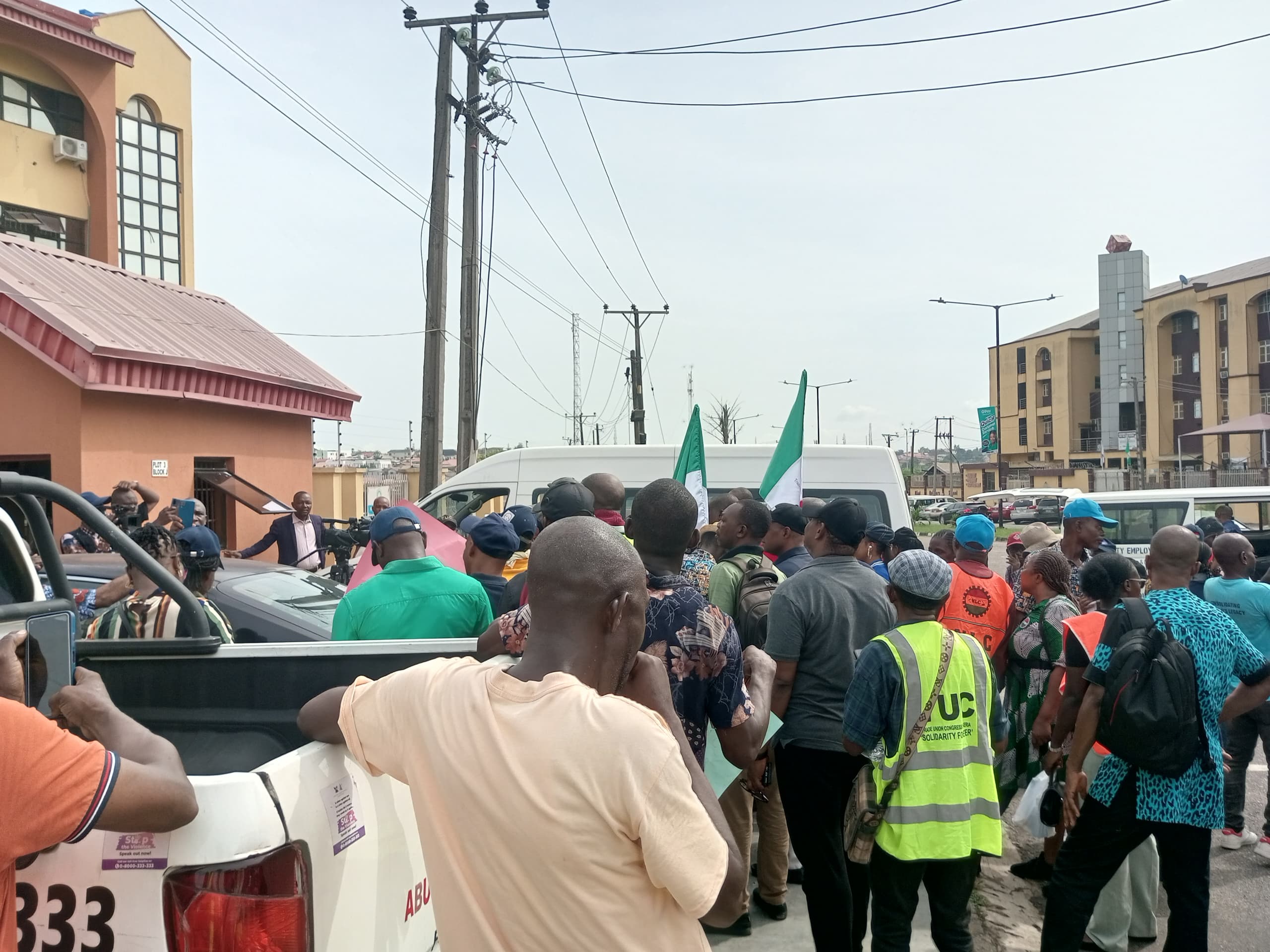
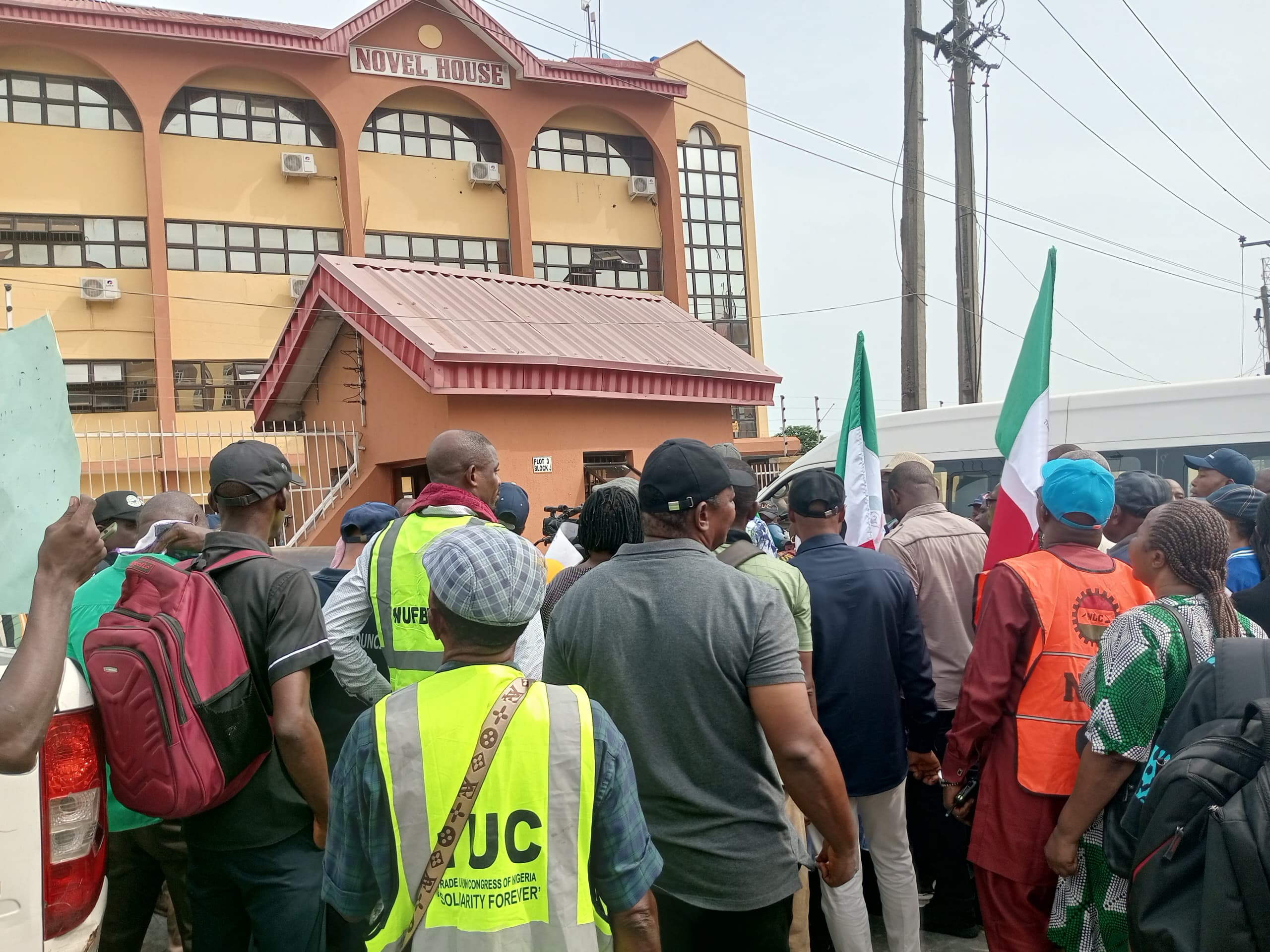
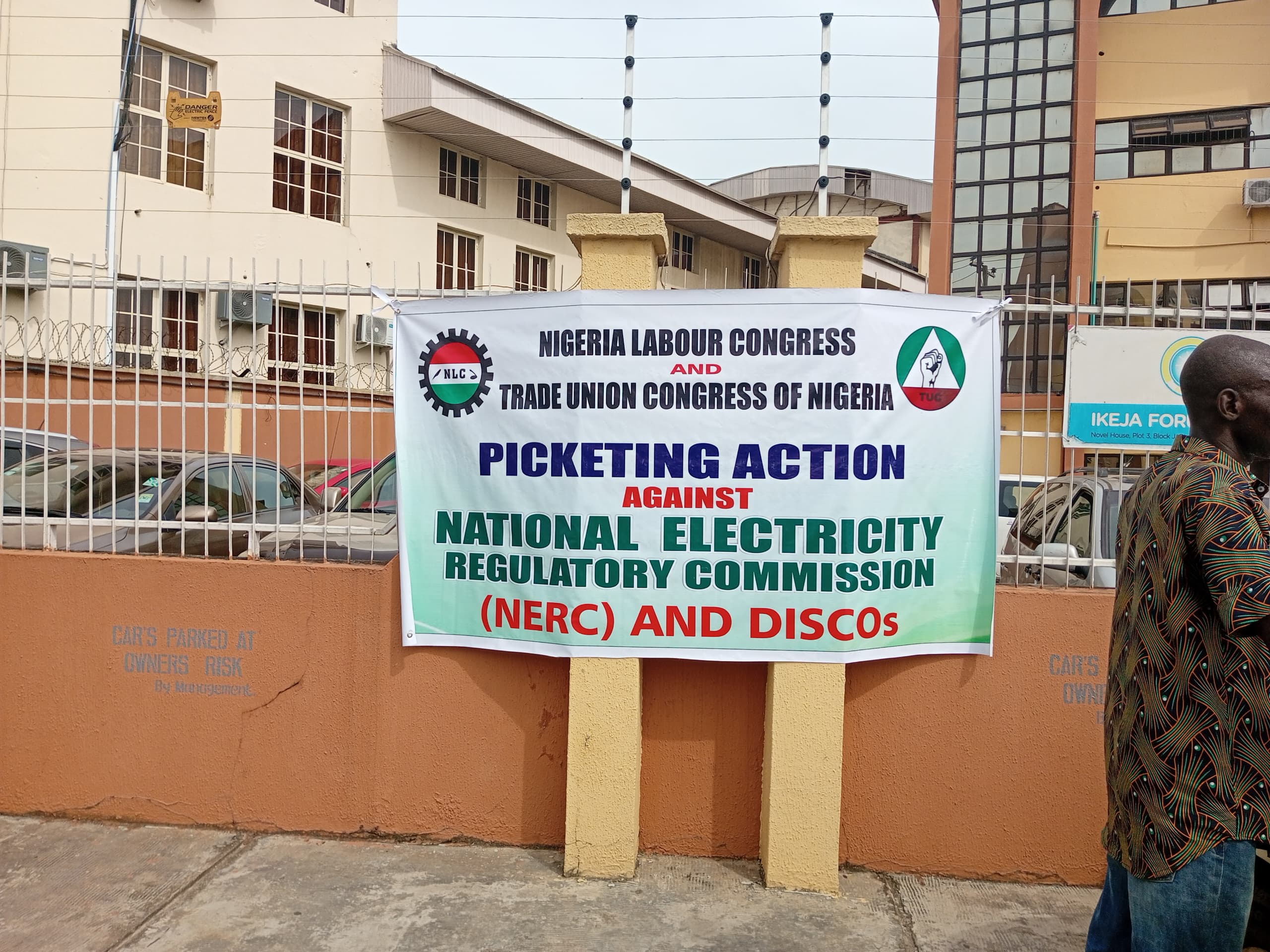
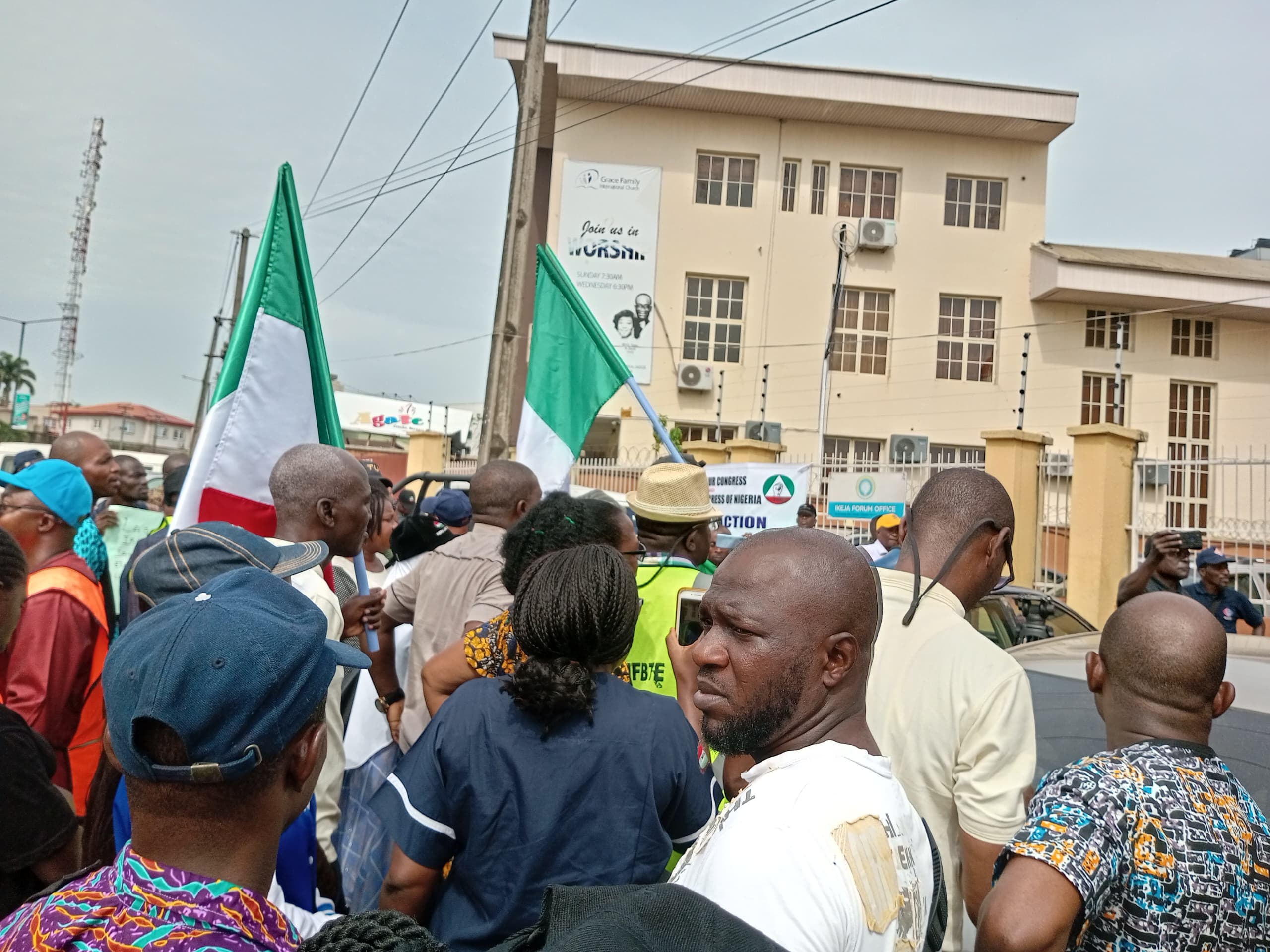
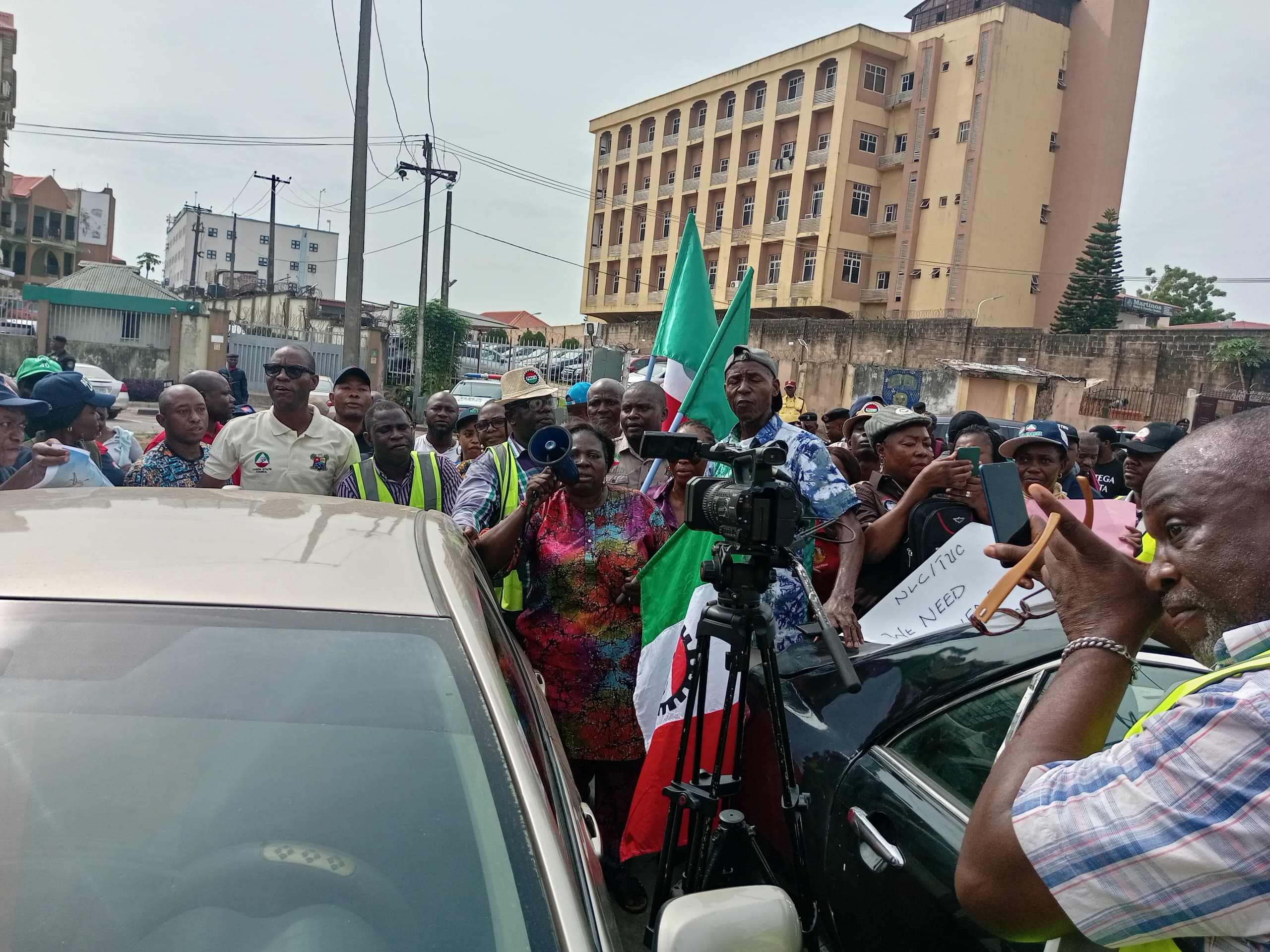
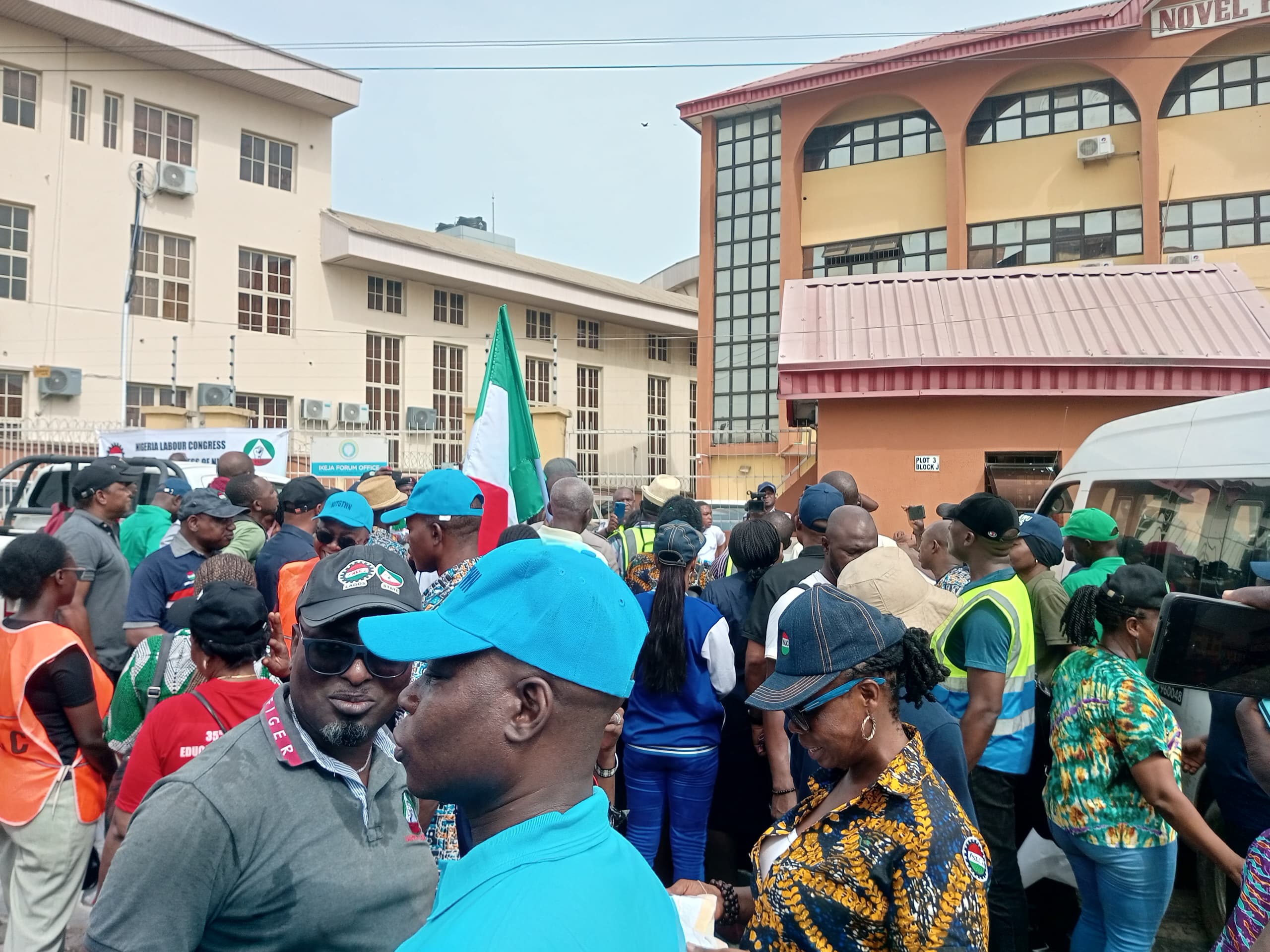
ABUJA
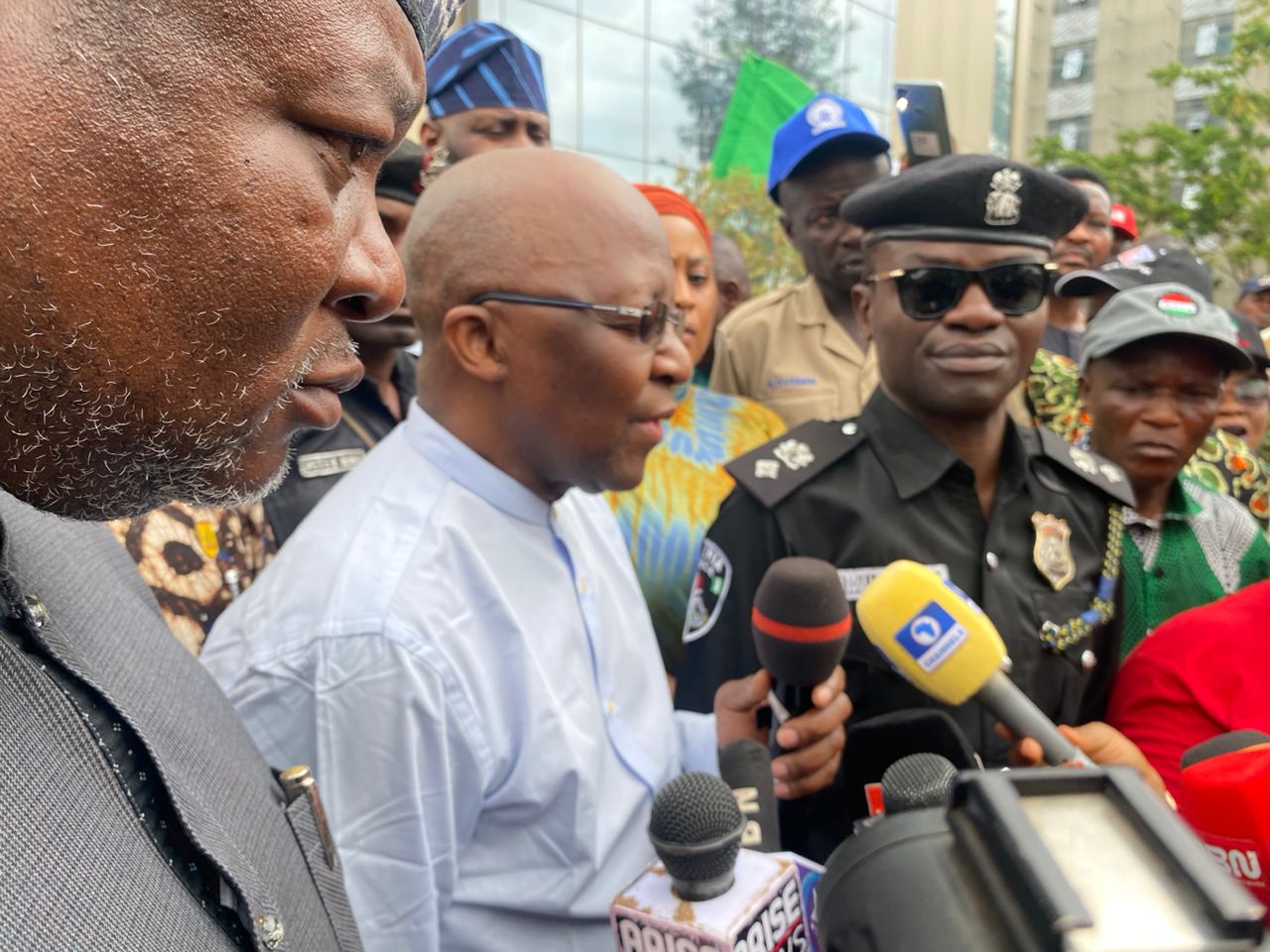
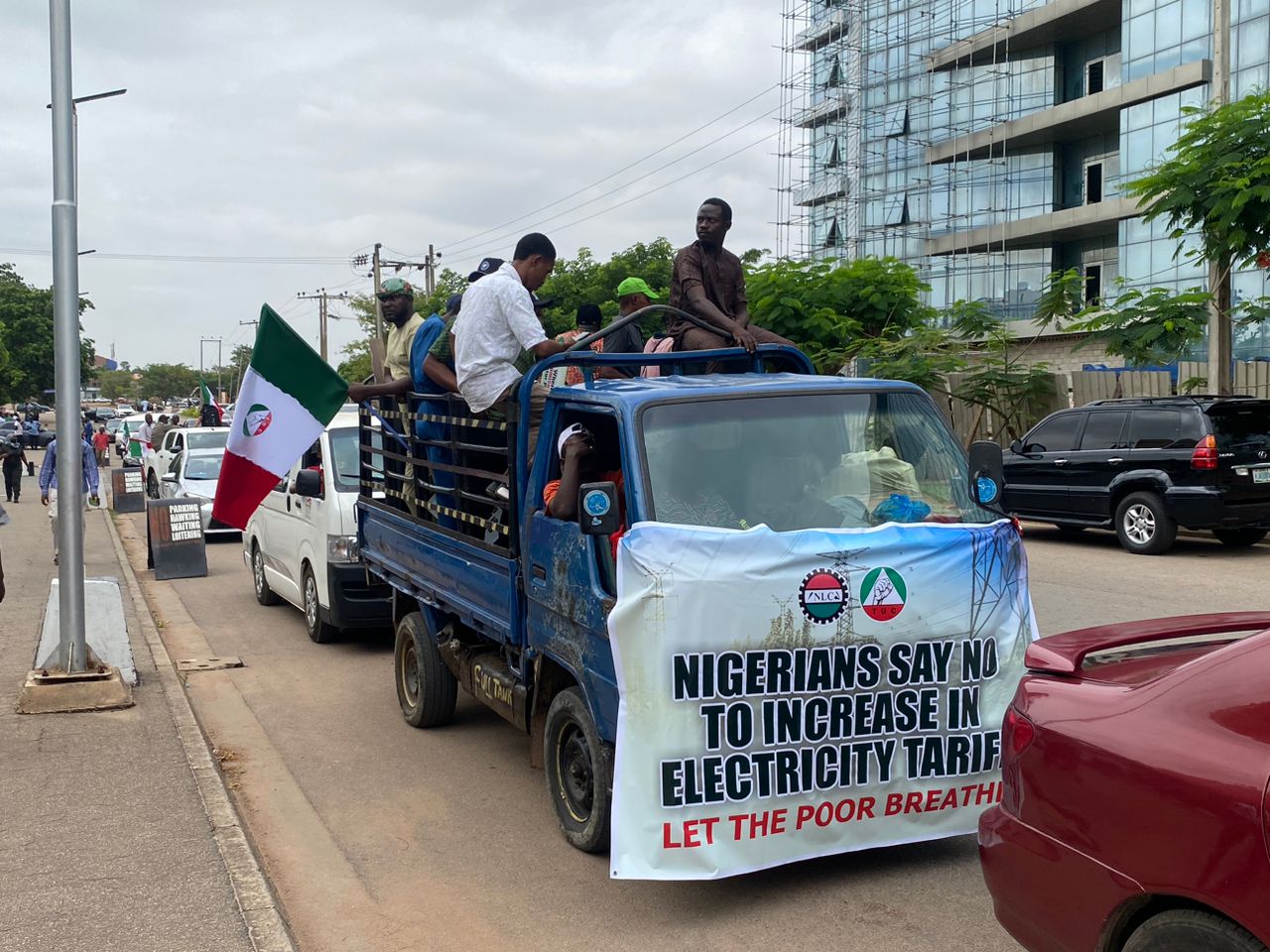
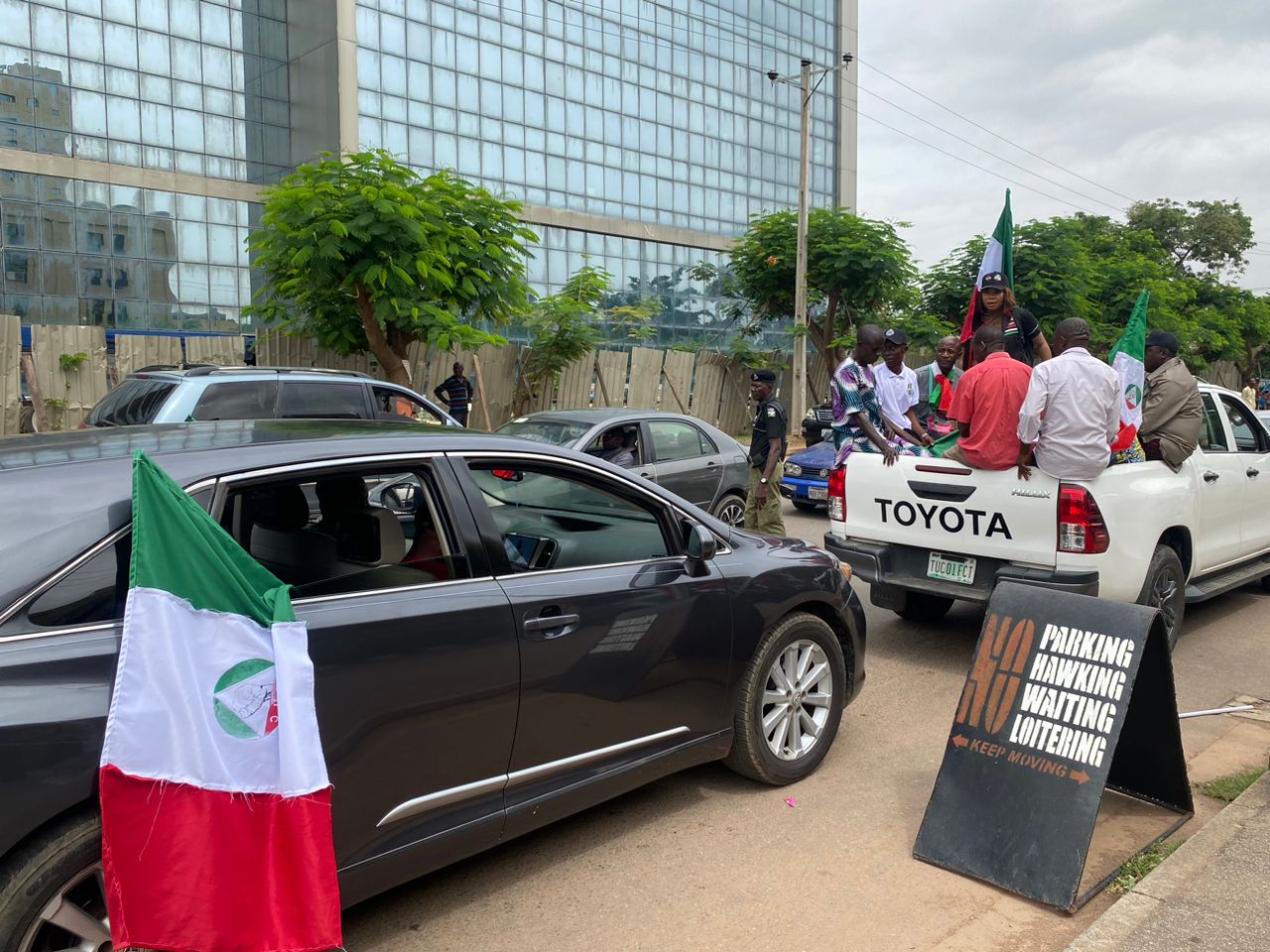
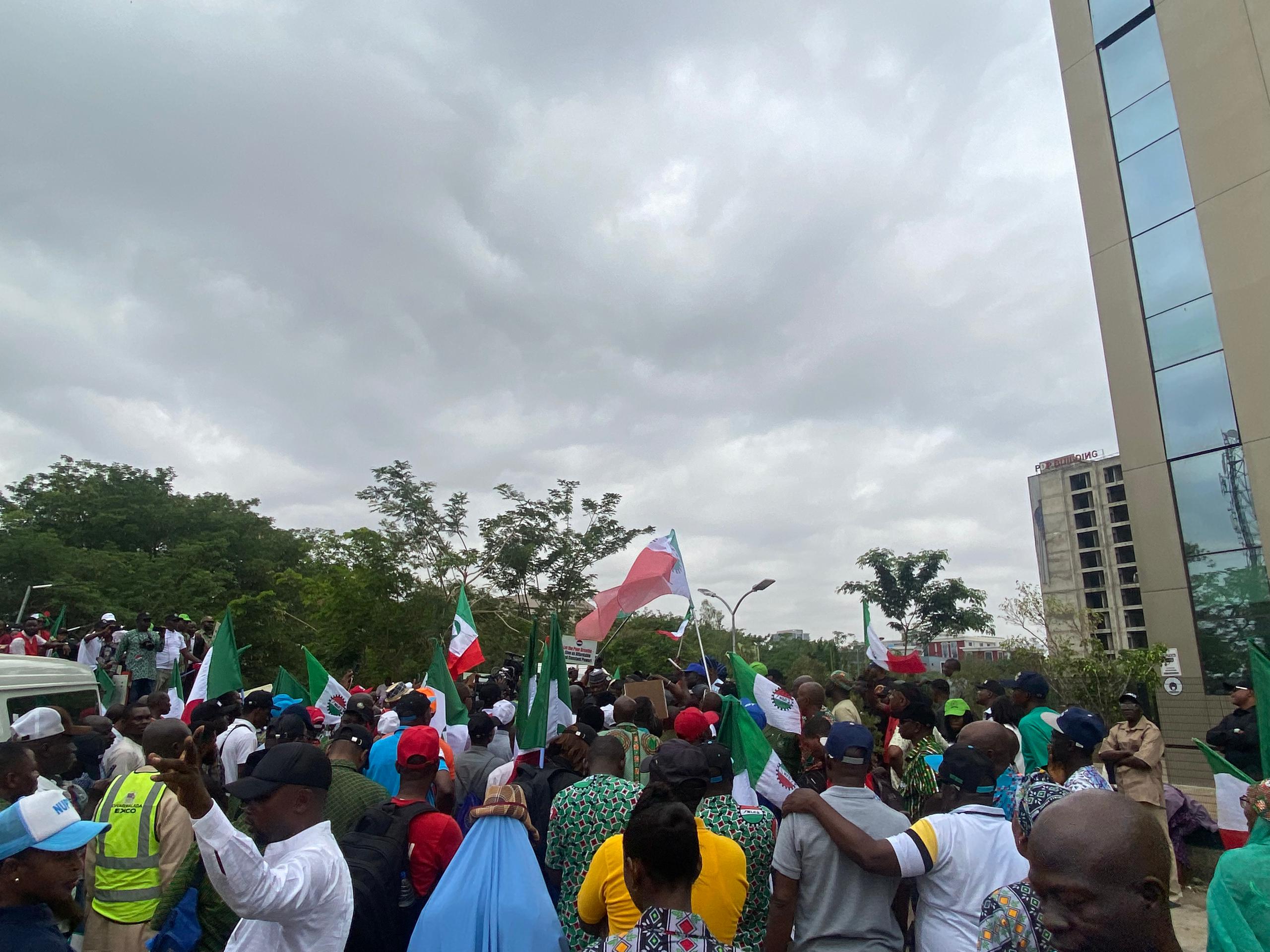
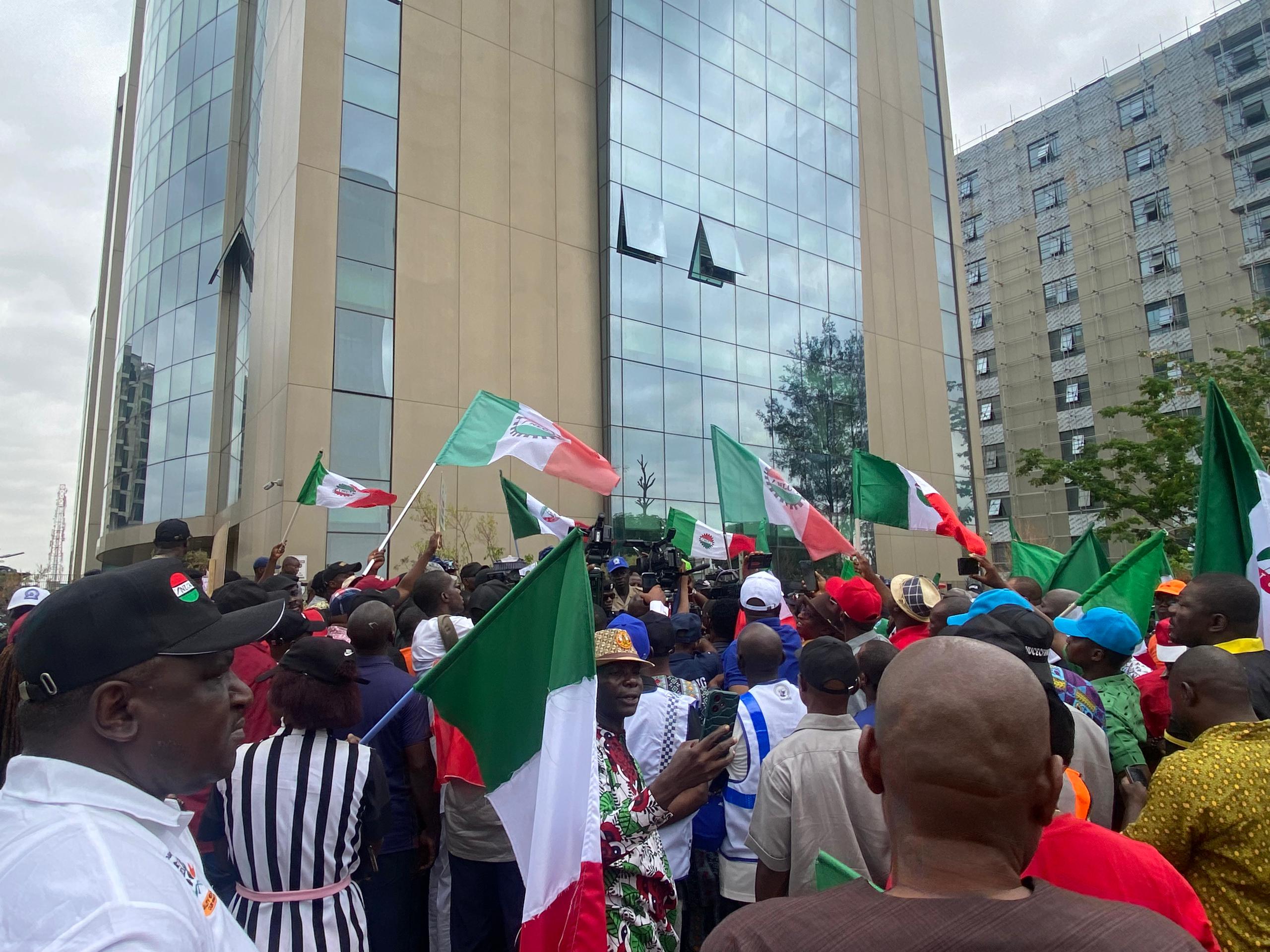
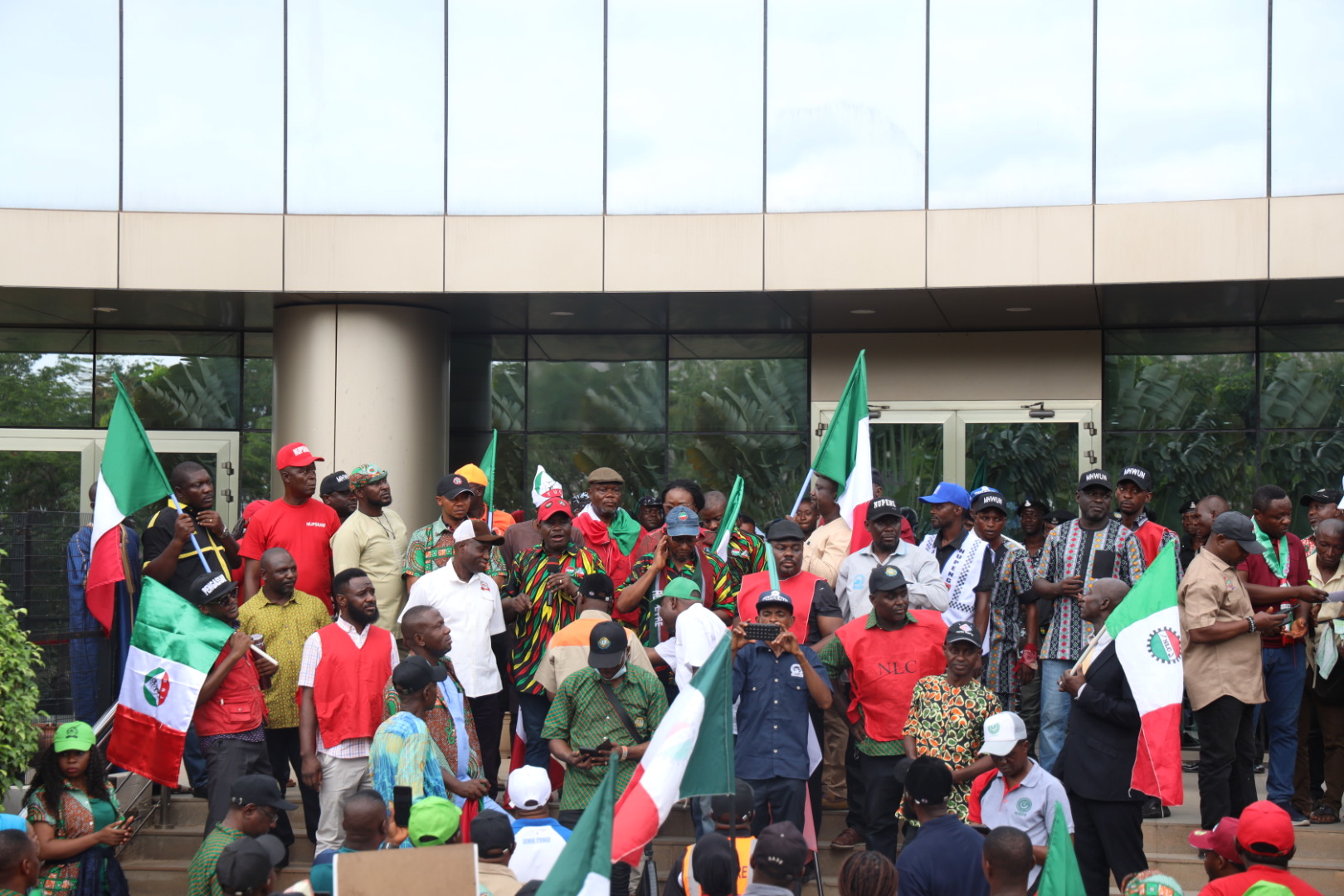
Ex-PDP BoT member, Idahosa rejoins APC
The former member of the Board of the Trustees, BoT, of the Peoples Democratic Party, PDP, and a former ally of Governor Godwin Obaseki, Charles Idahosa has rejoined the All Progressives Congress, APC.
Idahosa said he was rejoining the party he left with Obaseki about four years ago to ensure victory for the APC in the September 21 governorship election.
He made this statement at his residence where he was received by leaders of the party, led by the Secretary of the APC in Edo State, Lawrence Okah.
Idahosa revealed that his greatest regret while in PDP, was not allowing Obaseki to resign as Edo Governor when he opened up to him (Idahosa) in his Benin residence that he was tired of the troubles he was getting from the leadership of the party led by Comrade Adams Oshiomhole.
Interest rates would stay high until inflation is tamed - Cardoso
Olayemi Cardoso, governor of the Central Bank of Nigeria (CBN), has hinted interest rates would remain high until inflation rate subsides.
In a Financial Times report on Monday, Cardoso also said orthodox policies would be implemented to tame inflation.
In March, Nigeria’s inflation rate rose to 33.20 percent — from 31.70 percent in February.
Consequently, CBN’s monetary policy committee (MPC) raised the interest rate by 200 basis points in March to 24.75 percent.
Cardoso said there is “every indication” that MPC would “do whatever is necessary” to rein inflation.
“They will continue to do what has to be done to ensure that inflation comes down,” Cardoso said.
“Let’s face it: for a long period of time, the CBN did not embrace orthodox monetary policies.
“We want to go back to using an orthodox method, and it will take us to where we want to go.”
Cardoso said the apex bank had been “reoriented” to focus on “price and monetary stability”.
He said the official window of the foreign exchange (FX) market has been stabilised.
According to the governor, investors previously had a “tendency to head for the window” in response to currency fluctuations, however, there has been a “fundamental shift”.
“They’re getting more comfortable with the market,” Cardoso said.
The naira fell to its lowest level of N1,627.40/$ in the official FX window on March 8 but rallied to N1,154.08/$ on April 18 — after which the local currency began to lose its gains.
As of May 10, the official FX rate stood at N1,466.31/$.
Also, Cardoso maintained that raising interest rates has been crucial.
He hoped that high interest rates would not linger for too long and act as a disincentive to investment and production.
“Hiking interest rates obviously has had a dampening effect on the foreign exchange market, so that has begun to moderate. It’s not a zero-sum game. You lose on one side, you get on the other,” he said.
He said inflation was higher than he had hoped, blaming “distortions” mainly due to high food prices.
Cardoso said it is not directly within CBN’s control.
Food inflation rose to 40.01 percent in March, compared to the 24.45 percent rate recorded in the same month last year.
This is not the right time to implement cybersecurity levy - KPMG tells FG
KPMG Nigeria says the implementation of the cybersecurity levy should be reconsidered due to the current economic climate.
On May 6, the Central Bank of Nigeria (CBN) directed deposit money banks (DMBs) to start charging a 0.5 percent cybersecurity levy on electronic transactions, in line with the Cybercrime Act 2024 as amended.
Speaking on the directive in its latest tax alert issue, KPMG said this is certainly “not the right time to implement this levy”.
The firm added that although the idea was not new, it was unjustified under the prevailing economic condition.
KPMG said the key objective of the cybercrime levy is to ensure that there is dedicated and adequate funding available to address the growing threats of cyber-attacks.
However, KPMG said higher taxes do not lead to sustainable growth, adding that no country can tax itself to prosperity.
According to the firm, unintended consequences of any measure must be thoroughly evaluated before implementation.
“Undoubtedly, Nigeria faces a significant revenue challenge. This has, therefore, constrained, and continues to constrain, the country’s capacity for achieving sustainable growth,” KMPG said.
“Given this context, the government may go to any length to mobilise the required revenue.
“Perhaps, it is in recognition of this that the current administration and the Presidential Committee on Fiscal Reforms have often emphasized that the government will not introduce new taxes. Though the cybercrime levy is not new as it has been in existence since 2015, the question is why implement it now given the prevailing economic challenges?
“The timing of any reforms is essential to the success of such reforms. This underscores the current public resistance to the implementation of the levy.
“Hopefully, the National Insurance Commission (NAICOM) and the Nigerian Communications Commission (NCC) will consider this before introducing their guidelines with respect to those businesses under their purview.
“However, consideration must be given to the country’s prevailing economic conditions. The current economic climate does not justify its implementation now.”
FG SHOULD FOCUS ON TAX REFORMS THAT ADDRESS REVENUE LEAKAGES
KPMG said the federal government should focus on reforms that address revenue leakages and be financially prudent in the utilisation of public funds.
“Various reports have indicated that the government will raise about N3 trillion annually from the levy,” the firm said.
“However, there has been no formal presentation to the public of the cost and benefit analysis. It is always critical that the enactment of any tax or levy be accompanied by the tax expenditure statement to provide information as to whether the benefits of such tax or levy outweigh its cost.
“It is not sufficient to provide only the revenue projection, which is not certain as no details have been provided with respect to this; albeit there have been reports on how the money would be spent.
“There are many government agencies that have not been audited for years and nothing has happened! It is, therefore, critical that practical measures be put in place to ensure transparency and accountability.
“Hopefully, the government will reconsider delaying the implementation of the levy, which has been in the books since 2015.
“Government should focus on tax reforms that address revenue leakages and be financially prudent in the utilisation of public funds.
“Combining revenue-raising initiatives with responsible spending practices is essential for fiscal sustainability.”
The firm also raised concerns that businesses may resort to any measures to avoid the payment of the levy.
KPMG also said it is important that the government consider phasing in tax reforms on a gradual basis to minimise potential shocks to the economy.
The Days Of Being Above The Law In Paying Taxes Are Over – FG
The federal government said that the days of being above the law in paying taxes are over.
The Chairman of the Presidential Fiscal Policy and Tax Reforms Committee, Taiwo Oyedele, said this at the committee’s closing session on Sunday in Abuja.
Oyedele said the proposed new reforms would focus on the top 5 per cent of that sector, the middle class, and the elite for taxes.
He stated that the committee is drafting legislation to bring about necessary changes to the country’s fiscal policy and tax reform ecosystem.
The chairman stated that the new laws will ensure that reviews are continued by all governments, adding that they don’t want the entire effort to go to waste after a year or two.
He urged all stakeholders to fully cooperate with the government in implementing a new fiscal and tax policy for the general good of the citizens by ensuring compliance.
“We think that the days of being above the law in paying taxes are over. The same thing we’re saying to our leaders, whether they are elected or appointed.
“We think they have to lead by example by showing that they have paid the taxes, not only on time but correctly, to the lawful authorities as contained in the various laws,” he said.
He stated that the Federal Government is developing a system that will give tax relief to 95% of the informal sector in the country.
He said this would be achieved by exempting businesses earning N25 million a year or less from the various taxes hindering their progress over time.
“So, we think that 95 per cent of the informal sector should be legally exempted from all taxes; withholding tax, company income tax, and even payees on their staff.
“We’re using data to inform our decisions. Currently, if you earn N25 million a year or less, you don’t have to pay company income tax, and you don’t have to worry about VAT.
‘’We think that the informal sector are people who are trying to earn legitimate living; we should allow them to be and support them to grow to a point where they can then have the ability to pay taxes,” he said.
He explained that some of the taxes Nigerians complained about were already in the constitution, which the committee had examined and called for review.
Oyedele said that the committee report will go through the standard legislative process to obtain full legal backing.
Serie A: Fiorentina and Monza Looking to Win the Battle for a Top Half Finish
Fiorentina's hops of getting back into Europe for next season have taken a huge hit in the past few months, and although a spot in the Europa Conference League is still on the cards from a mathematical point of view, fans will be disappointed to see the Europa League spot of sixth disappear after previously occupying a spot in the top six just a matter of months ago.
The Florence side now sit down in ninth and 10 points adrift of Roma in sixth, with Fiorentina now winning only 14 of the 34 games so far. On the other hand, this does also mean one extra game to play, so there is still a glimmer of hope.
Fiorentina are coming into this one, however, with yet another spot in the Europa Conference League final after losing to West Ham United last season in the same competition's final.
This comes after a 1-1 draw with Club Brugge in Belgium where Lucas Beltran scored a penalty in the final 10 minutes of the game to hand the Serie A side a 4-3 on aggregate after winning 3-2 on home soil.
On the other hand, Fiorentina did lose to Hellas Verona last weekend in Serie A, which has put their hopes of another spot in Europe in serious doubt. Gaetano Castrovilli scored in the first half that day for his side.
The last win for Vincenzo Italiano’s men came in a 5-1 battering over Sassuolo, as Nicolas Gonzalez carried on his great form with a brave, alongside a finish each from Riccardo Sottil, Lucas Martinez Quarta and a goal from Antonin Barak.
As for Monza, they will be pleased to have survived another season, where they continue to battle to get into the top half of the Serie A table.

The club currently sit in 11th with a gap of two points on Torino up in 10th. As well as this, Monza have not had any fears of relegation for some time, but they will want to better their 11th-placed finish from last campaign.
Fiorentina vs Monza pick: Fiorentina to win and cover the -1 AH spread
Fiorentina have been pretty inconsistent in recent matches, but most of their poor performances came were away from home. At Stadio Artemio Franchi, Viola won back-to-back games vs Sassuolo and Club Brugge and were undefeated in the last five.
Monza is in terrible form. They have been winless in the last six and won just three points during that time. Throughout the season, they have been solid away from home. However, their five wins in 17 road games came mostly against the teams from the bottom of the league's table: Sassuolo, Frosinone, Verona, Salernitana, and Genoa.
In the first h2h game this season, Fiorentina won 1:0 away from home in a match where Viola completely controlled the game. Now, at Stadio Artemio Franchi, we believe Fiorentina should secure a comfortable home win, considering their good home record and Monza's terrible form.
Fiorentina vs AC Monza Serie A Head to Head (H2H) stats
-
AC Monza 0 : 1 Fiorentina
-
AC Monza 3 : 2 Fiorentina
-
Fiorentina 1 : 1 AC Monza
SRC: FORBET
Rivers APC, LP, PDP Leaders Pitch Tent With Wike For Commitment To Tinubu’s Agenda
Several key political figures in the Andoni local government Area of Rivers State have expressed their admiration for the dedication shown by the Minister of the Federal Capital Territory (FCT), Nyesom Wike, towards advancing the goals of President Bola Tinubu-led administration, Naija News reports.
The group includes former and current political leaders from the Peoples Democratic Party (PDP), All Progressives Congress (APC), and Labour Party (LP), as well as respected Elder Statesmen, Community Leaders, Youth, and Women Leaders from the region.
They emphasized their unwavering support for Wike as a token of gratitude for his backing of Erastus Awortu during the 2021 Local Government Chairmanship election.
The political bigwigs also commended Awortu’s administration for proffering solutions to insecurity and decayed infrastructure in the area.
During a recent visit to the council’s chairman at Ngo, the group expressed their admiration for his accomplishments as his tenure nears its conclusion. Additionally, they assured him of their unwavering support for his re-election campaign.
The National Women Leader of the GrassRoots Development Initiative (GDI), Mabel Ogolo, highlighted that with divine guidance and political vision, Wike appointed Erastus Awortu to bring relief to the people of Andoni during his time in office.
“Indeed, the choice was right because within weeks into his administration, Andoni became so peaceful and free from the challenges of insecurity and underdevelopment which bedevilled the area,” she said.
A prominent member of the APC and a candidate for governorship in the 2023 general election, Sampson Ngerebara, praised Awortu’s administration as a realization of his vision for Andoni.
He highlighted the administration’s focus on rebuilding infrastructure and enhancing human capacity by utilizing the resources of the people.
In response, Awortu, the Council Chairman, expressed gratitude to the leaders for their unwavering support despite the political crisis in the state and commended their loyalty to Wike, a former governor of the state.
Furthermore, the chairman emphasized his dedication to the progress and advancement of the area. He stated that he would rather forgo his second-term bid than collaborate with politicians whose past actions disrupted the peace and development of the region.
How God dealt with billionaires who queried me over their tithe – Pastor Adeboye
The General Overseer of Redeemed Christian Church of God, RCCG, Pastor Enoch Adeboye, has disclosed how God dealt with some billionaires who questioned his accountability over their tithes.
Pastor Adeboye disclosed that four billionaires from one of the branches of RCCG had written to him demanding to know how the ministry spent their tithes.
Addressing his members, Pastor Adeboye disclosed that God punished the branch as most of the members started suffering in their businesses and their contracts were being cancelled.
He said: “The tithe that was coming from this family was hefty. All of a sudden a handful of the big men wrote to me and said every month, you must give us an account of how you are spending our tithe. I said okay, ‘what they are asking for is alright, they are simply asking for transparency. Nothing is wrong with that.
“I said, however, I have gone through the Bible, I have not seen anywhere where God spoke to Moses and said every month, you must give an account of the tithe children of Israel to them. So, I said alright, I will do two things.
“Number one, I will prepare a detailed account of how your money is spent, including if we buy a bottle of coke for first timers. I will put it in a file and every month when you people come for the Holy Ghost Service, that file be on the table. I won’t give it to you. I will put it on the table.
“Anyone who wants to see it can go and read it. But make sure you wait till I have left the room because everything that we are doing in earth is being recorded in heaven. I don’t want my God to say you are the one who handed it over to them and you are there when they were reading. And I did it.
“Number two, I told the treasurer, from now on, any tithe that came from this family, don’t add it to the rest, put it aside. Let me find out if the God who sent me can run his church without these people’s contributions. So, for two separate years, every kobo that came for this family was kept in a separate account.
“It was when Aboaba came from Ibadan, I sent him there and then after he had been in the church for some months, he came to me. He said the people you asked me to go and join are complaining that things are not going well, and they have found out that they offended me, and that’s why their contracts are being cancelled and all manner of things are happening.
“I said we are not quarrelling and God knows I wasn’t quarrelling. I just ignore it. He then said when you knew this was the problem, why did you send me there? I said I didn’t know anything was happening. I just want to know how gracious God can be to me. Then, we reconciled. It wasn’t everybody that offended me.
“It was a handful of people who thought that they were cleverer than God and they brought problems to everybody. It will interest you to know that every one of those involved in that group is no longer in the church and they are not where they ought to be, let me just put it like that.”


![[OPINION] Cybersecurity Levy: Matters Arising - Reuben Abati](/media/k2/items/cache/95ab44161514c695033355c3460424db_Generic.jpg?t=20240514_084345)







